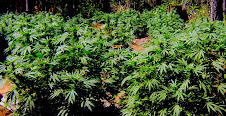Claudio,
I agree that "We must work hard to convince people that drug prohibition is a folly: harmful, ineffective, counterproductive, extremely expensive, and morally wrong" but that doesn't preclude pointing out the existing legal protections afforded by the "religious freedom" that we're supposed to have (even if we don't), and the fact that Cannabis IS an "herb bearing seed."
If "We can't attack drug warriors with arguments based on the meaning of words" then words lose their meaning. I think it's important to respect the meaning of words, even if no one else does. The legal and pragmatic distinctions need to be made by us or, as you suggest, they won't be mentioned at all. All arguments are relevant as a part of a comprehensive rationale.
In the interest of peaceful discourse, I think it's important not to characterize what we do as "attacking drug warriors." I prefer to reason. to educate. I seek to understand and find common ground with people who are reasonable.
"Drug warriors" who refuse to acknowledge compassion, science and reason can be disempowered by legally and logically convincing people who are truly concerned with solutions to problems being created by prohibition.
To this end, one indisputable distinction between drugs and herbs is that herbs grow from the soil, drugs don't. This brings up obvious differences in the possibility of "control."
Another difference is that drugs are more concentrated and homogenized than herbs. This makes drugs more dangerous than herbs. Public safety is a legitimate concern, that favors the freedom to farm.
Finally, herbs are a product of nature, a gift from "god." In debating prohibition with people whose thinking is often oriented toward "religion," this argument may carry more weight than logic. Herbs are a fundamental right, at least in theory, protected by international treaty.
Ofcourse hypocrisy exists in the drug policy debate, but that doesn't mean we have to go along with it, or have what ought to be a legitimate legal argument derailed by it.
skip to main |
skip to sidebar

Drugs don't make seeds. Herbs do.

Here the spacing between hemp stalks is even more apparent. Inches apart, not feet.

Marijuana plants are multi-branched, planted six feet apart.

This is a field of marijuana. Note these are multi-branched, exclusively female, grown with plenty of room between each plant.

This is "industrial hemp" grown in vast swaths, planted inches apart, pollen-producing males & seeded females mixed. Pollen from this field would make seeds in marijuana plants, rendering them much less salable on the black market. If the DEA really wanted to impact the marijuana trade they wouldn't be pulling up feral hemp in the midwest, they'd be encouraging American farmers to plant hemp, to naturally balance high- and low-THC producing strains of Cannabis.


Competition from chemically-based industries are the true motivation behind prohibition of industrial hemp.
14. Barack Obama, Executive Order 13603 - National Defense Resources Preparedness
17.Strategic and Critical Materials 2013 Report on Stockpile Requirements
http://mineralsmakelife.org/assets/images/content/resources/Strategic_and_Critical_Materials_2013_Report_on_Stockpile_Requirements.pdf

Preying Mantis licking hemp resin
Freedom to farm "every herb bearing seed" is the first test of religious freedom. How bad do things have to get before all solutions are considered?
PayPal
Help me help you help everyone...
If you find value in this work, please feel invited to share the good news, or if you can, lend practical support using PayPal. There is something we all can do to heal our Mother Earth. One person can make a difference but one person can’t make a difference by themselves. 🙏
Cannabis is essential not illegal.

Drugs don't make seeds. Herbs do.
Hemp harvesting in France

Here the spacing between hemp stalks is even more apparent. Inches apart, not feet.
Can you tell the difference...?
Marijuana plants are multi-branched, planted six feet apart.
"Swiss mix" marijuana

This is a field of marijuana. Note these are multi-branched, exclusively female, grown with plenty of room between each plant.
Harvesting Hemp, Noirmoutier, France 2003

This is "industrial hemp" grown in vast swaths, planted inches apart, pollen-producing males & seeded females mixed. Pollen from this field would make seeds in marijuana plants, rendering them much less salable on the black market. If the DEA really wanted to impact the marijuana trade they wouldn't be pulling up feral hemp in the midwest, they'd be encouraging American farmers to plant hemp, to naturally balance high- and low-THC producing strains of Cannabis.
"In God We Trust"
Mission Statement
The mission of the California Cannabis Ministry is to identify Cannabis agriculture as integral to a free society and essential for human survival.
Boreal Forests of the world, "The Taiga" Region
Hemp climate zone map

A word from brother Paul
The real money

Competition from chemically-based industries are the true motivation behind prohibition of industrial hemp.
Start your own individual ministry.
The California Cannabis Ministry is meant to serve everyone, as an individual expression of our Article One, Bill of Rights, "First Freedom." The freedom of religion afforded by the United States Constitution secures our natural, god-given, self-evident rights that are also also guaranteed by several international human rights treaties.
Anyone who has genuine appreciation for the Cannabis plant, for any or all of its many uses and benefits, is reminded that deep in our hearts, we are all our own ministers. I trust that others will be inspired by my example, but everyone makes their own choices. California Cannabis Ministry encourages everyone to start their own individual ministries. I believe it is spiritually and legally meaningful for each of us to openly claim our rightful place in the most ancient, truly global Cannabis culture, even if doing so is judged an act of "civil disobedience" by unobjective courts.
It is recommended that you read this entire website for the research and knowledge being passed on. The THC Ministry website also offers a wealth of essential information. You are invited to write to projectpeace@gmail.com to subscribe to the ministry newsletter and join the discussion.
"Freedom of religion is the freedom of an individual or community, in public or private, to manifest religion or belief in teaching, practice, worship, and observance. It is generally recognized to also include the freedom to change religion or not to follow any religion. Freedom of religion is considered by many in many nations and people to be a fundamental human right." -- Wikipedia
Anyone who has genuine appreciation for the Cannabis plant, for any or all of its many uses and benefits, is reminded that deep in our hearts, we are all our own ministers. I trust that others will be inspired by my example, but everyone makes their own choices. California Cannabis Ministry encourages everyone to start their own individual ministries. I believe it is spiritually and legally meaningful for each of us to openly claim our rightful place in the most ancient, truly global Cannabis culture, even if doing so is judged an act of "civil disobedience" by unobjective courts.
It is recommended that you read this entire website for the research and knowledge being passed on. The THC Ministry website also offers a wealth of essential information. You are invited to write to projectpeace@gmail.com to subscribe to the ministry newsletter and join the discussion.
California Cannabis Ministry BlogTalkRadio Show
Recommended Reading
- National Institute on Drug Abuse, Final Report, 1991-1994 http://www.thc-ministry.org/NIDA_Report.jpg
- The Economics of Prohibition, Dr. Mark Thornton
- The Emperor Wears No Clothes, Jack Herer
- The Jefferson Bible, Thomas Jefferson
UV Index
Blog Archive
-
▼
2009
(57)
-
▼
January
(11)
- Current Conversation
- Dear Mr. President and staff,
- Freedom is possible for the first time in our lives.
- A simple policy question for President Obama
- "essential civilian demand"
- The meaning of words: Establishing the pragmatic a...
- The UV-B Equation
- Freedom to farm is the first test of religious fre...
- Reply to Virginia's call for a strong response to ...
- Comment on ENCOD's response to the European Commis...
- Dear Brian and friends in the Obama Transition Team,
-
▼
January
(11)
Additional References:
1. The Ho‘omaluhia or "Peacemaker" Award
2. First Freedom Project
3. US HI: OPED: 'Ice' Addiction Is Booming, Thanks To Anti-Pot Efforts
Pubdate: Tue, 2 Sep 2003
Source: Honolulu Star-Bulletin (HI)
4. 1991-94 Final Report, "Ice and Other Methamphetamine Use: An Exploratory Study"
4. An Open Letter to Hon. MICHAEL B. SHAPIRO, FLORENCE T. NAKAKUNI! and MICHAEL K. KAWAHARA
5. Cannabis vs. "Global Broiling": An Inconvenient Solution
*References to "essential civilian demand" in government documents
*6. 44 C.F.R. PART 334—GRADUATED MOBILIZATION RESPONSE
Title 44 - Emergency Management and Assistance,
§ 334.6 Department and agency responsibilities. (f)
*7. THE DEFENSE PRODUCTION ACT OF 1950,AS AMENDED[50 U.S.C. App. § 2061 et seq.]Title VII - General Provisions Sec. 708. VOLUNTARY AGREEMENTS AND PLANS OF ACTION FORPREPAREDNESS PROGRAMS AND EXPANSION OF PRODUCTIONCAPACITY AND SUPPLY [50 U.S.C. App. § 2158] Page 2, paragraph 1
http://www.fema.gov/library/viewRecord.do?id=3590
[Also, see #13. William J. Clinton Executive Order 12919 below]
8.Franklin D. Roosevelt Executive Order 9280 - December 5, 1942
Delegating Authority Over the Food Program.
9. Harry S. Truman Executive Order 10161 - September 9, 1950
Delegating Certain Functions of the President Under the Defense Production Act of 1950
10. Dwight D. Eisenhower Executive Order 10480-- August 14, 1953
Further providing for the administration of the defense mobilization program
11. John F. Kennedy Executive Order 10998 - February 16, 1962
ASSIGNING EMERGENCY PREPAREDNESS FUNCTIONS TO THE SECRETARY OF AGRICULTURE
12. Richard Nixon Executive Order 11490 - October 28, 1969 -Assigning Emergency Preparedness Functions to Federal Departments and Agencies
*13. William J. Clinton Executive Order 12919 - June 3, 1994
National Defense Industrial Resources Preparedness
15. American Presidency Project
16. MANAGING TERRORISM’S CONSEQUENCES: LEGAL ISSUES http://www.law.depaul.edu/centers_Institutes/ihrli/downloads/managing_terrorisms_consequences.pdf
17.Strategic and Critical Materials 2013 Report on Stockpile Requirements
MantisOnMarijuana

Preying Mantis licking hemp resin
Help me help you help everyone...
If you find value in this work, please feel invited to share the good news, or lend practical support using the PayPal button below, that there is something we all can do to heal our Mother Earth.









